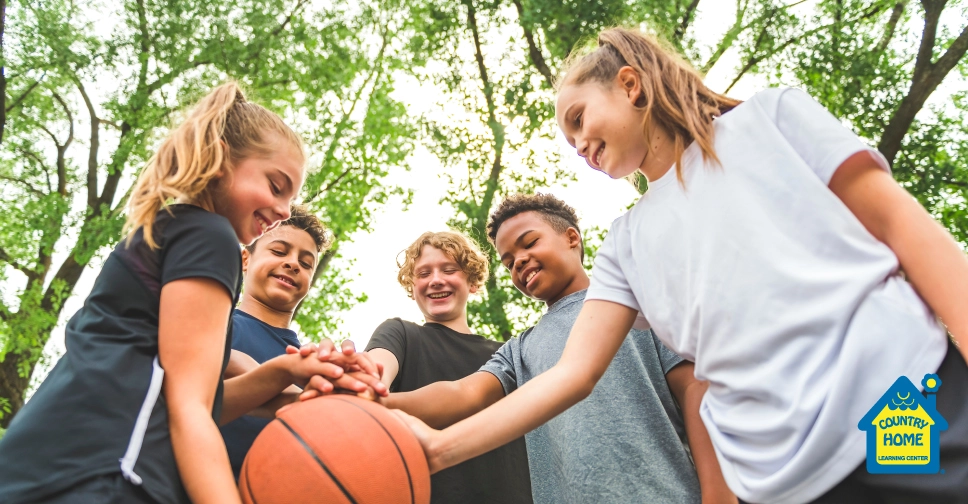
There’s little doubt that youth sports can be a wonderful outlet for kids, both physically and mentally. In fact, 73 percent of parents think sports benefit their children’s mental health, and 88 percent of parents think sports benefit their children’s physical health, according to Health.gov.
Basketball in particular is a popular sport that many kids choose to participate in, whether they like to play as an organized team or just a pick-up game after school. Indeed, the value of teamwork in youth basketball can’t be overstated. Just as in life, success in basketball can’t be achieved through individual efforts alone. A team must work together, share the ball, and support each other on their path to victory. Also, players have to trust one other and understand their roles so they can accomplish their goals — on and off the court.
Youth Basketball: Developing Teamwork
Invaluable lessons about teamwork can be instilled that go beyond just the game. Even the youngest of children can use the teamwork skills they learn in basketball and apply them to life situations. As a parent or coach, here’s how you can foster leadership in your kids with the game of basketball.
- Establish Clear Roles: Make sure each player on the team has a clear understanding of the role they play and their responsibilities. This way, everyone is working toward the same goal while minimizing confusion on the court.
- Encourage Communication: No team can function without effective communication. Encourage your players to make themselves known both on and off the court, whether through on-court drills or after-practice team meetings.
- Build Trust: Trust forms the framework of a team. Be transparent with your kids and players, fostering honesty and accountability through team-building and ice breaker activities.
- Foster a Positive Environment: Players will feel more confident and comfortable when they are able to participate within a positive environment. Set realistic expectations, help them learn from their mistakes, teach them to be good losers (and winners), and celebrate successes, big and small.
- Emphasize Collaboration: A team doesn’t work without collaboration. To foster a culture of collaboration, encourage players to work together to reach a common goal while supporting each member.
Why Youth Basketball is Good for Your Kids
Basketball, just like all youth sports, brings tremendous benefits to children of all ages. Playing sports when young can form the foundation for a lifetime of strong values, instilling in kids the skills to be a good leader with empathy and the ability to communicate with others. Here are some positives that can come from participation in youth sports.
Boost Self-Confidence
Basketball builds confidence while encouraging physical activity. This not only improves overall health, it gives kids a boost in self-esteem that can reach into other areas of their everyday lives. They learn essential skills such as problem-solving, teamwork, and communication, plus they learn to handle adversity and pressure while developing motor skills. Youth sports provides a big opportunity for social interaction, not just with peers but with adults as well. The competitive nature of basketball helps kids set goals and strive for success.
Teach Teamwork
Basketball is a great tool for learning the importance of teamwork. As a member of a team, kids learn how to work together to reach a common goal. They also pick up important communication skills to help them cooperate with their teammates. The development of leadership skills can be honed as each child tries different roles within the team. Kids ultimately will learn how to be part of a successful team while realizing that every single person’s contributions are vital to success. Lastly, basketball teaches good sportsmanship and respect for opponents, win or lose.
Strengthens Cognitive Skills
Basketball helps kids develop and strengthen cognitive skills, helping them to think on their feet while making split-second decisions. This leads to the development of more agile thinkers who are better able to problem-solve, implement strategies, and plan ahead. Youth sports also encourage hand-eye coordination while improving motor skills and reaction time. They have to be able to aim, shoot, and get the ball in the hoop while constantly moving – that takes a lot of concentration and follow-through!
Learn about After School Programs at Country Home Learning Center Today
Here at Country Home Learning Center, we value youth sports just as much as parents do, and believe they contribute to the mental and physical well-being of our students. As part of our after school programs, we offer a large indoor climate-controlled gym with basketball court, complete with adjustable hoops that ensure even our youngest players can participate. We also have soccer fields where the kids can engage in friendly soccer matches and other organized games. Contact us today to schedule your tour and learn more about our offerings in San Antonio and Austin.

